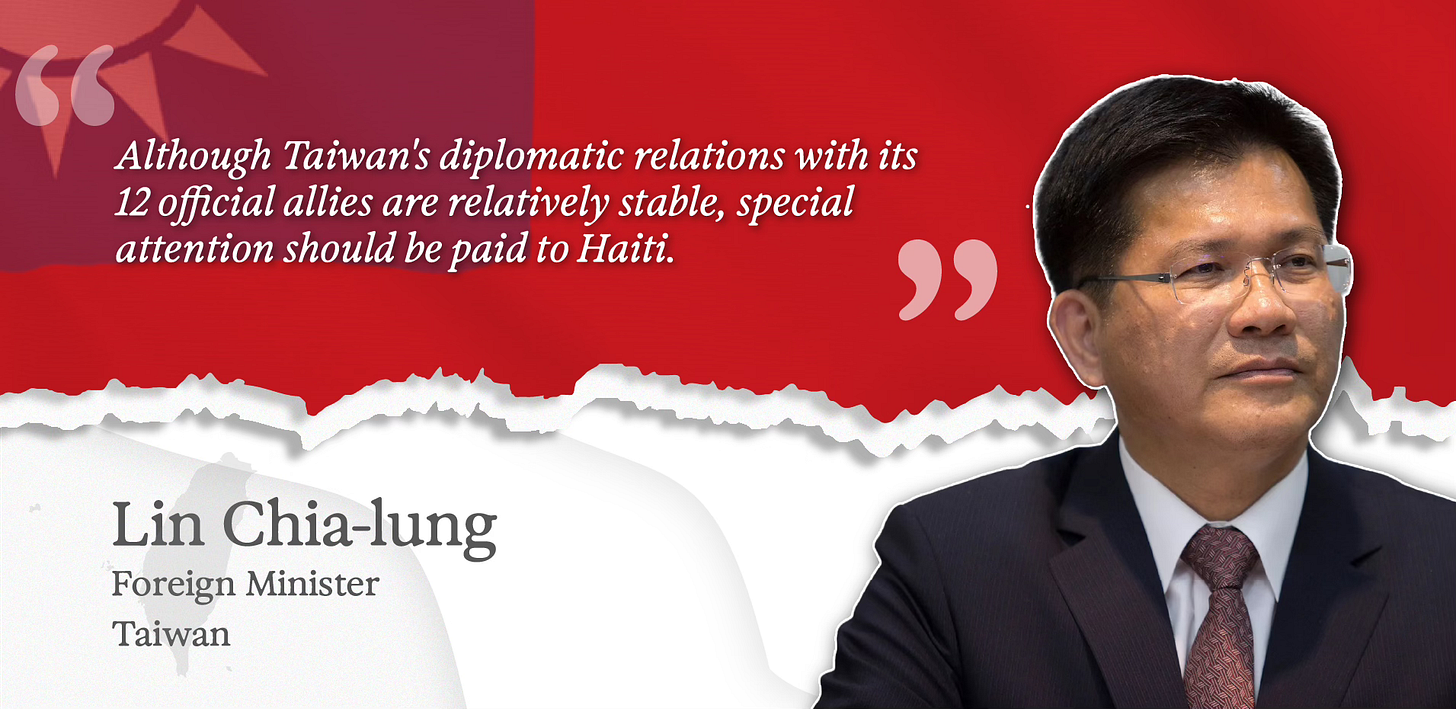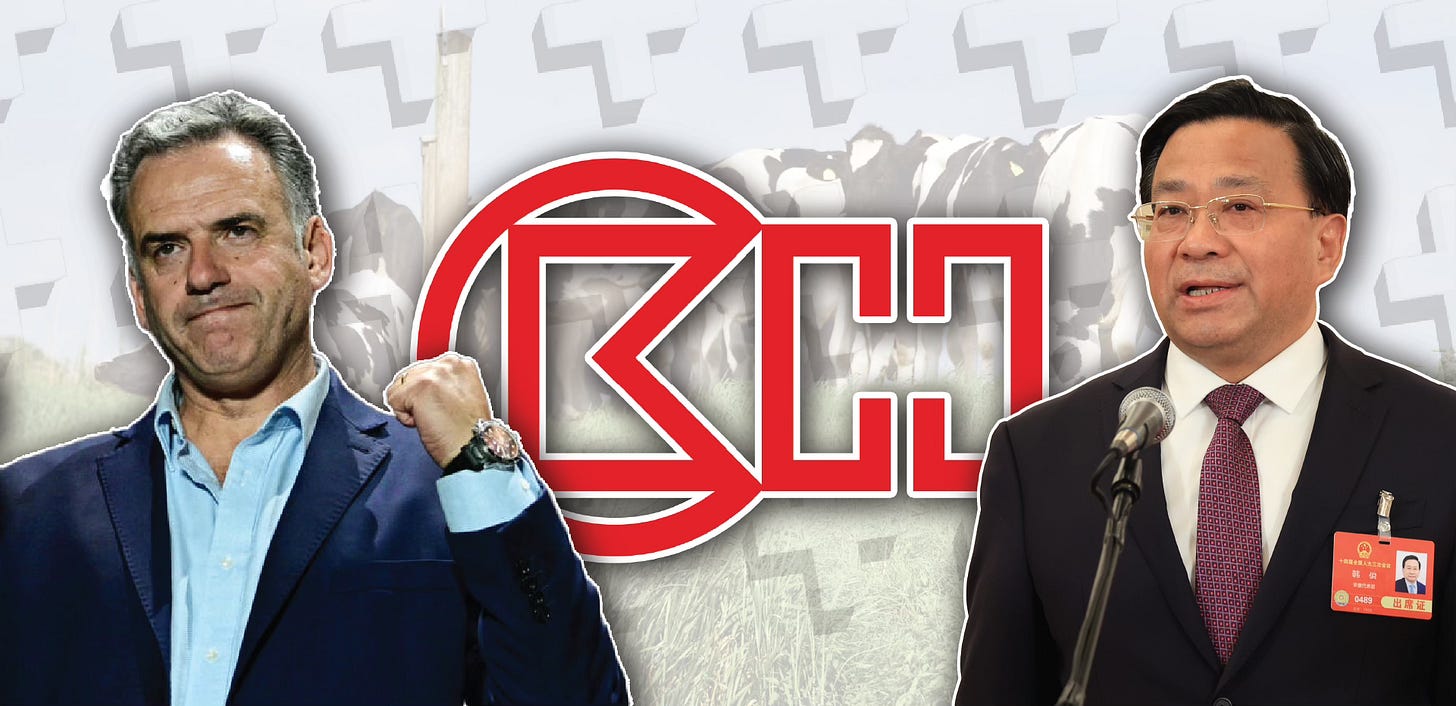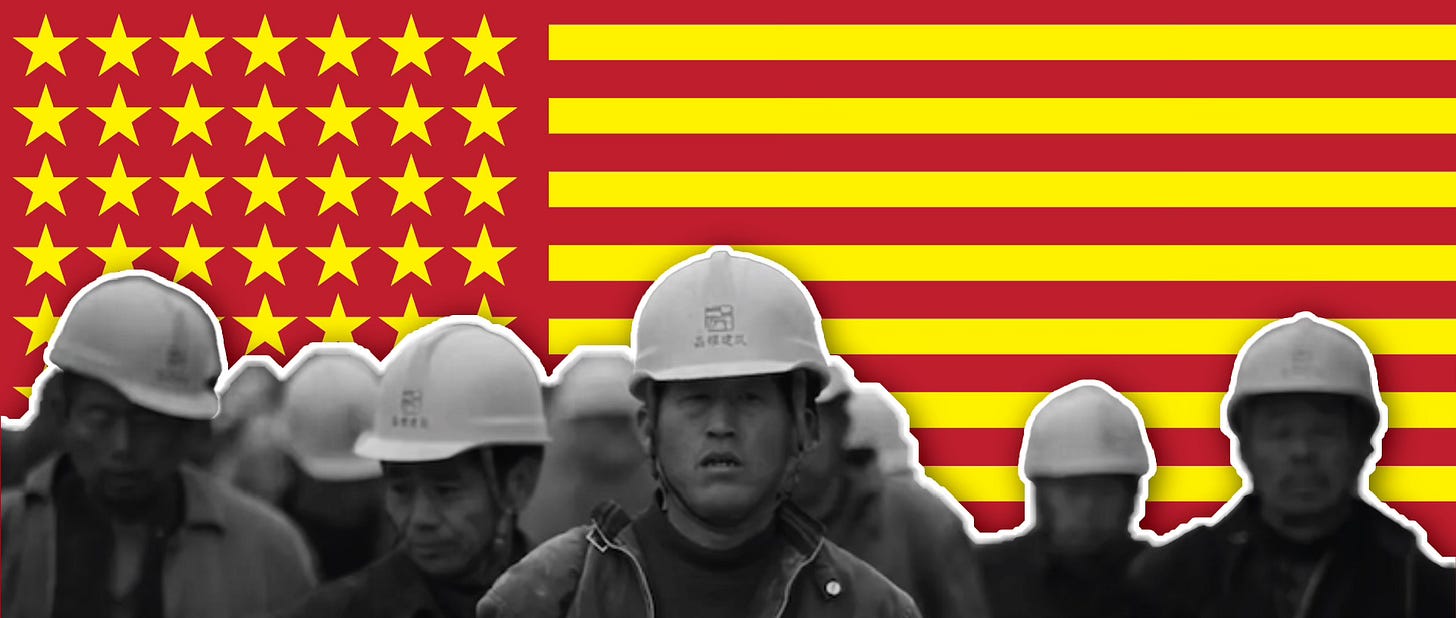Paying Special Attention
Blackrock takes over Chinese ports in Panama, new Chinese tariffs on Canada, and final round of PRC-Honduras FTA. Plus: The costs of Trump's foreign aid freeze.
Welcome to Chaufa, a China-Western Hemisphere Newsletter by CPSI.
Today’s edition covers February 24 to March 10.
Listen on Spotify
The Top 5 Stories:
A consortium led by U.S. asset management firm Blackrock signed a $23 billion deal with CK Hutchison Holding to purchase dozens of ports worldwide, including two ports near the Panama Canal that had fueled U.S.-Panama tensions in recent months.1 CSIS published a feature on the potential impact of the deal. In response to the agreement, a Chinese spokesman simply said “China supports Panama's sovereignty over the canal and is committed to maintaining the status of the canal as a permanently neutral international waterway.”
The news came a few days after Panama’s chief prosecutor had asked the country’s Supreme Court to annul Hutchinson’s port concessions.
President Trump has been using Chinese companies’ presence near the canal as a rationale to threaten to take back the waterway since last year. However, while this deal would ideally mollify his administration’s greatest concerns, shortly after the deal was announced Trump still insisted that his administration’s plan was to “reclaim” the canal.
In the midst of President Trump’s on-again off-again trade war against Mexico, Canada, and China, the PRC is also separately facing trade tensions with Washington’s neighbors. Recently, China retaliated against Canada’s tariffs from last fall on Chinese EVs and steel with new duties on agriculture products. More specifically, China put a 100% tariff on Canadian rapeseed oil, oil cakes, and peas, while it put a 25% levy on aquatic products and pork. At the same time, Mexican President Sheinbaum said that her government would “review” its tariff rates on Chinese goods, which could lead to new duties on PRC imports.
These developments show how the U.S.’s protectionist turn is having cascading effects on international trade; as Washington puts new tariffs on both its friends and competitors, its actions also are encouraging those countries to raise their trade barriers.
China is a relatively minor export destination for both Canada and Mexico; in 2023, it made up 5% of Canada’s exports and 2.5% of Mexico’s exports. Because of this, Chinese reciprocal tariffs would likely have relatively minor effects compared to U.S. tariffs on these countries. That said, Chinese exports to these countries are still a notable source of goods, with 11% for Canada and nearly 20% for Mexico in 2023.
The Chinese Ministry of Commerce suspended beef imports from six companies from Argentina, Brazil, and Uruguay without explanation. However, the ministry recently launched an investigation into an oversupply of beef from South America that had resulted in major losses for Chinese companies.
In the days before the meeting and possibly signaling a desire to resolve the issue, Chinese Agriculture Minister Han Jun met with his Uruguayan counterpart Alfredo Fratti in Montevideo to expand trade and technology cooperation. Han was in town to attend President Orsi’s inauguration. (Xinhua)
Argentina, Brazil, and Uruguay made up more than 65% of China’s frozen beef imports in 2023, so a substantial reduction in their beef trade with China could significantly help Chinese beef production (while also significantly hurting those countries’ agriculture exports).
Hinting potential rockiness in formal diplomatic relations, Taiwan Foreign Minister Lin Chia-lung said in a radio show that Taiwan’s diplomatic relations with Haiti required “extra attention”, though he suggested that cooperation with Washington could improve the situation.
Haiti uniquely is the only one of Taiwan’s remaining diplomatic partners that has a formal trade office in Beijing and a PRC office in its capital. Because Haiti is frequently the subject of UN Security Council resolutions that are subject to China’s veto, there have historically been some suggestions that the country is especially vulnerable to PRC coercion.
Honduras and China are negotiating the final round of their Free Trade Agreement. The final stage is centered on the two sides identifying the economic sectors that they will continue to protect to reduce the negative impacts of the agreement. The Honduran vice foreign minister also suggested that these FTA negotiations had prompted the United States to start talks on modernizing its trade agreement with Honduras.
The two countries established ties in 2023 and started FTA negotiations shortly thereafter. The agreement could be especially important for Honduras, as some of the country’s key exports (namely shrimp and coffee) suffered after losing market share in Taiwan’s market.
Currently, China has five FTAs in the Western Hemisphere (Costa Rica, Ecuador, Chile, Peru, and Nicaragua).
Core Brief
Eliminating the U.S. foreign policy alphabet soup enables abusive Chinese business practices
Just last month, Bolivia’s lower house of Congress continued to refuse to approve a questionable set of lithium contracts with Chinese (and Russian) companies. Because of Bolivia’s close political ties with China, this decision doesn’t reflect a tilt away from China or some grand political scheme. Rather, it provides an example of how Latin American and Caribbean (LAC) governments have the agency and ability to resist unfair contracts and business practices.
Although Bolivia might be a surprising example of how to protect a country’s interests from possibly unfair business practices, it is not alone in standing up for itself. After it came to light that Jinjiang Construction was abusing its workers, Brazil’s Public Labor Prosecutor forced the contractor to halt work on a new BYD electric vehicle plant. Similarly, prosecutors in Ecuador and Peru have been hard at work over a series of corruption cases implicating Chinese firms. Just this week, a notable Chilean legislator was investigated for inappropriate business links with a couple of Chinese businessmen.
This is to say that Chinese business abuses are a serious issue in the region, but Latin American and Caribbean countries have the agency and interests to protect themselves from labor, environmental, and corruption law violations. While they are far from perfect, regional governments have the institutions and ability to enforce their laws and protect their citizens.
So at a moment when Washington is laser-focused on the negative repercussions of Chinese business practices in the Western Hemisphere, the Trump Administration’s decision to defund key U.S. institutions like USAID and the National Endowment for Democracy (NED) ultimately hurts these efforts.
Both USAID and NED have long supported training and workshops for anti-corruption and good business practices. Eliminating these agencies simply makes it easier for all firms, including Chinese companies, to get away with business abuses.

The Roundup
Politics and diplomacy
The head of the Chilean Chamber of Deputies, Karol Cariola, was accused of inappropriate business links with multiple Chinese businessmen, including Emilio Yang. The Chilean media has speculated that Yang may have acted on behalf of the Chinese government. In response, the Chinese embassy denied that Yang was acting as an intermediary on behalf of the PRC government.
Honduras hosted a China-CELAC financial cooperation workshop in late February, with representatives from all 33 member states reportedly in attendance.
Investment, finance, and infrastructure
A new $546 million Chinese-financed Mutún steel plant was inaugurated in Bolivia on February 24. The plant is expected to produce up to 200,000 tons of steel annually
The Cuban city of Cotorro launched a new 22MW solar project that was built with Chinese support. Similarly, Villa Clara will inaugurate its 22MW solar plant built with Chinese-manufactured solar panels in the coming days.
China donated 430 solar lamps to Barbados. The Deputy Prime Minister said that these would primarily be used to illuminate residential communities.
Nicaraguan government officials and representatives from Chinese firm CCCC virtually signed a $69 million financing agreement for the new 55MW El Barro wind farm project.
Meanwhile, supposedly commemorating International Women’s Day, Nicaragua delivered 500 new Chinese buses to upgrade the country’s public transportation system. (Telesur)
A group of Chinese investors led by China Kingstone Mining Holdings plans to purchase 700 hectares of mining concessions largely focused on gold extraction in Los Rios in Chile.
Trade and Technology
Ecuadorian trade union National Association of Energy and Oil Workers (ANTEP) criticized the government’s decision to let Chinese and Canadian firms take over the Sacha oil field.
China’s BIOMA and Argentina’s INTA extended their five-year agreement on knowledge exchange and technology transfer for biogas production.
Taiwan
Canada and Taiwan signed a Science, Technology, and Innovation Agreement (STIA) and held the first meeting of the bilateral Joint Committee on Science and Technology. Conversations focused on AI, ICT, and net-zero technology.
In an effort to enhance cooperation with Belize, Taiwan both invited Belizean healthcare professionals to an intensive training course in Asia and financially supported a vanilla cultivation training course for women.
A Taiwanese business delegation of 13 companies traveled to Guatemala, resulting in an agreement to buy 720,000kg of Guatemalan coffee (a 50% increase from last year).
A former Japanese Ambassador to Paraguay confirmed that China tried to condition a supply of COVID-19 vaccines on flipping recognition from Taipei to Beijing.
A joint U.S.-Taiwan medical mission is delivering specialized medical services across St. Lucia, while the local Taiwan Technical Mission (TTM) gave a training on seedless watermelon cultivation.
Society and culture
The University of the West Indies (UWI) in Jamaica, China Agricultural University (CAU), and the Chinese International Education Foundation (CIEF) signed an MOU to reopen the university’s Confucius Institute.
El Salvador’s vice president hosted China Group Group’s (CMG) Director-General for Latin America, Zhu Boying. The two sides discussed enhancing El Salvador’s image through CMG and possibly making the country a regional headquarters for the company.
The International Communications Group of China (CICG) held a cooperation forum earlier this March at Mexico City’s Intercontinental University (UIC), with discussions largely focusing on education and culture but also touching on trade and technology.
Representative of how Chinese-Caribbean relations are also promoted by local governments, Hunan province held a tourism promotion in event “to consolidate Hunan as a world-class tourist destination and strengthen the relationship with the Dominican Republic.”
The President of the Chinese Academy of Tourism met with Cuba’s ambassador to Beijing to discuss the benefits of tourism to the country, including safety and eco-tourism.
Analysis and Opinion
Loop News ran a piece on how China’s 2025 planned foreign policy changes might affect the Caribbean, including increased visa-free access and more free trade policies.
Evan Ellis argues in The Diplomat that the Trump “administration’s approach to competition with China, and to global engagement more broadly, could unwittingly facilitate the extension of Beijing’s influence” in Latin America.
Margaret Myers delivered testimony to the Senate Foreign Relations Committee on U.S. competition with China in the Western Hemisphere, stating that she is “concerned about the progress that China—and Russia, for that matter—has made toward dismantling U.S. ties in the region, whether through targeted messaging campaigns, political alliances, or because of its now-extensive economic footprint in the hemisphere.”
The National Interest published an op-ed by James Holmes on how Chinese naval expansion in to the Caribbean, especially in Venezuela or Cuba, could threaten the United States’ security.
Julieta Pelcastre wrote about China Civil Engineering Construction Corporation (CCECC)’s corrupt business practices and how its upcoming projects in Honduras may harm the Central American country in Dialogo Americas.
Dialogue Earth published an article by Rodrigo Rodríguez on how Colombia is juggling relations between the United States and China as it prepares to join the Belt and Road Initiative.
That’s it for now, see you again in two weeks!
Make sure you don’t miss the next issue of Chaufa 👇
Given other strategic Chinese companies’ (namely Bytedance regarding TikTok) willingness to fight back against U.S. pressure, this very quick sale at least somewhat suggests that the ports were probably not much more than a business opportunity (rather than an essential strategic asset). Put another way, if these ports had been essential to some CCP plan to be able to disrupt the canal, it seems strange that Hutchinson would so quickly relent from the port business.


